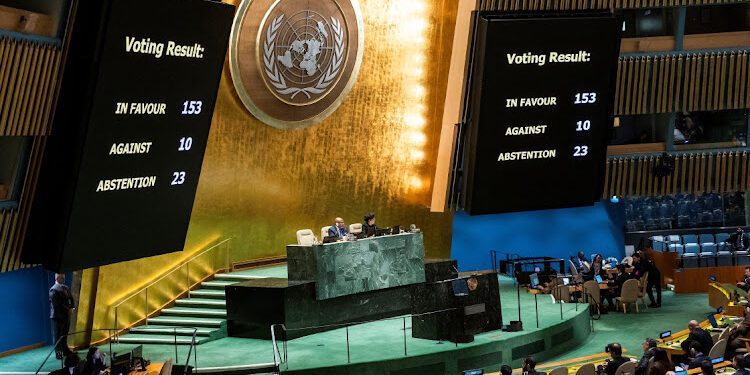In a historic move, the United Nations General Assembly overwhelmingly voted to demand an immediate humanitarian ceasefire in the ongoing conflict between Israel and Hamas. This resolution comes after the United States vetoed a similar proposal in the Security Council last week. The global community has expressed growing concern over the escalating violence, and this General Assembly resolution reflects the urgent call for a cessation of hostilities.
The General Assembly Vote:
With 153 countries voting in favor, 23 abstaining, and the United States, Israel, and eight others voting against, the resolution highlighted the international community’s stance on the need for an immediate end to the conflict. While General Assembly resolutions are not legally binding, they carry significant political weight and reflect a collective global perspective on the situation.
UN Secretary-General’s Call for Ceasefire:
The United Nations Secretary-General, Antonio Guterres, has consistently advocated for a humanitarian ceasefire, emphasizing the dire humanitarian situation in Gaza. Guterres has raised alarms about the global threat posed by the conflict and the urgent need for diplomatic efforts to bring about peace in the region.
President Biden’s Criticism of Israel:
U.S. President Joe Biden, addressing donors to his 2024 re-election campaign, expressed concern over Israel’s “indiscriminate” bombing of Gaza. Biden emphasized that Israel’s security depends on global support, and the indiscriminate use of force jeopardizes that backing. These remarks mark a notable shift in Biden’s tone, revealing a growing rift in U.S.-Israel relations.
Challenges to Ceasefire:
While the General Assembly resolution calls for an immediate and unconditional humanitarian ceasefire, challenges persist. The United States, along with Israel, argues that a ceasefire may be temporary and could pose dangers, particularly if it allows Hamas to regroup and launch further attacks. The complexities of the situation make achieving a lasting ceasefire a formidable task.
Humanitarian Crisis in Gaza:
The conflict has taken a severe toll on the residents of Gaza, with over 18,000 reported casualties and widespread destruction. The United Nations has repeatedly highlighted the humanitarian crisis, stressing the urgent need for aid and emphasizing the plight of hundreds of thousands of people facing starvation.
Future Diplomatic Efforts:
As the international community rallies for a ceasefire, future diplomatic efforts will play a crucial role in mediating between the conflicting parties. The United Nations, regional powers, and global leaders must work collaboratively to find a sustainable solution that addresses the root causes of the conflict and ensures a lasting peace.
The UN General Assembly’s overwhelming support for a humanitarian ceasefire underscores the global community’s concern for the escalating violence in the Israel-Hamas conflict. The resolution sends a powerful message, urging an immediate end to hostilities and emphasizing the need for diplomacy to address the underlying issues. The world now watches closely as efforts intensify to bring about a lasting and just resolution to this longstanding conflict.
















